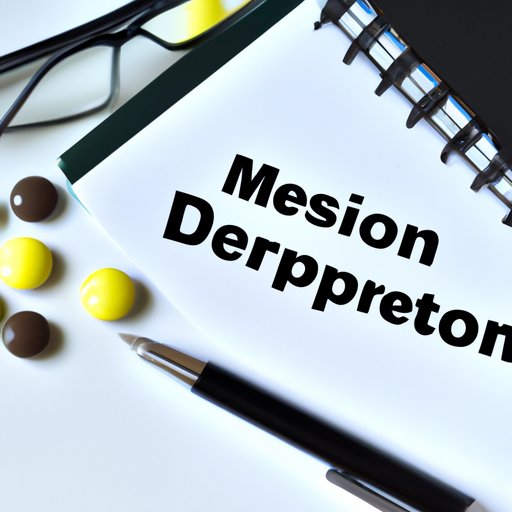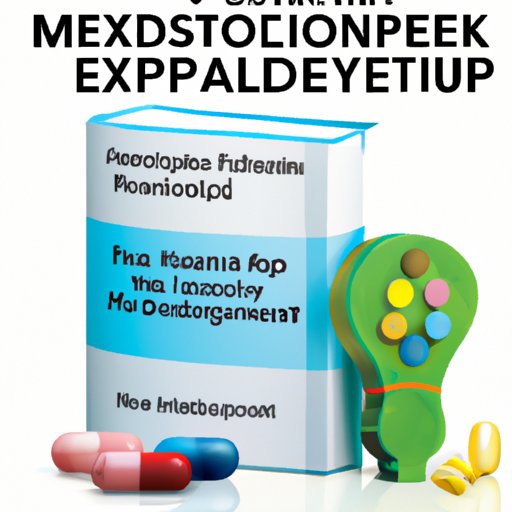

Understanding MDD Treatment: A Comprehensive Guide to Available Therapies
Major depressive disorder (MDD) is a mental health condition that affects millions of people worldwide. It is characterized by persistent feelings of sadness, hopelessness, and lack of interest or pleasure in activities that one used to enjoy. While MDD can have a significant impact on one’s daily life, the good news is that effective treatments are available for this condition. In this article, we will take a closer look at the different therapies available for MDD treatment, how they work, and what you should consider when choosing a treatment.
Available Therapies for MDD Treatment
There are several effective therapies available for MDD treatment. The most commonly used therapies are medication and therapy, but a newer treatment option known as transcranial magnetic stimulation (TMS) has also been developed in recent years.
Medication
Antidepressant medications are often used as a first-line treatment for MDD. These medications help regulate brain chemistry by increasing the levels of certain neurotransmitters, such as serotonin, that are associated with mood regulation. There are several types of antidepressant medications available, including selective serotonin reuptake inhibitors (SSRIs), serotonin-norepinephrine reuptake inhibitors (SNRIs), atypical antidepressants, and tricyclic antidepressants.
Therapy
Psychotherapy, or talk therapy, is another effective treatment option for MDD. There are several types of therapy available, including cognitive-behavioral therapy (CBT), interpersonal therapy (IPT), and psychodynamic therapy. CBT is the most commonly used therapy for MDD, as it focuses on identifying and changing negative thought patterns and behaviors that contribute to a person’s depression. IPT helps people improve their relationships and communication skills, while psychodynamic therapy focuses on exploring the unconscious motivations behind a person’s behavior and emotions.
Transcranial Magnetic Stimulation (TMS)
TMS is a newer treatment option for MDD that uses magnetic fields to stimulate nerve cells in the brain. This stimulation can help regulate brain activity and improve symptoms of depression. While TMS is generally considered safe, it is only used as a treatment option for people who have not had success with other forms of treatment.
In-Depth Look at Medication Treatments
As previously mentioned, medication is a commonly used treatment option for MDD. There are several types of medication available, each with its own set of benefits and potential side effects.
Selective Serotonin Reuptake Inhibitors (SSRIs)
SSRIs are the most commonly prescribed antidepressant medication for MDD. They work by increasing the levels of serotonin in the brain, which can help regulate mood. SSRIs are generally considered safe and have fewer side effects than other types of antidepressants. Some common SSRIs include sertraline (Zoloft), fluoxetine (Prozac), and citalopram (Celexa).
Serotonin-Norepinephrine Reuptake Inhibitors (SNRIs)
SNRIs are another type of antidepressant medication that help regulate the levels of serotonin and norepinephrine in the brain, which can improve mood. Common SNRIs include venlafaxine (Effexor) and duloxetine (Cymbalta). SNRIs can cause side effects such as nausea, sweating, and dizziness.
Atypical Antidepressants
Atypical antidepressants include medications that do not fit into the other categories of antidepressants. These medications work by targeting different neurotransmitters in the brain, such as dopamine or norepinephrine. Bupropion (Wellbutrin) is an example of an atypical antidepressant.
Tricyclic Antidepressants
Tricyclic antidepressants were one of the first types of antidepressant medication developed. They work by increasing the levels of serotonin and norepinephrine in the brain. Tricyclic antidepressants are generally not used as a first-line treatment for MDD due to their potential side effects, which can include dry mouth, constipation, and blurred vision.
In-Depth Look at Therapy Treatments
Therapy is another effective treatment option for MDD. Therapies such as CBT and IPT can help people identify and change negative thought patterns and behaviors that contribute to their depression.
Cognitive-Behavioral Therapy (CBT)
CBT is the most commonly used form of therapy for MDD. It involves identifying negative thought patterns and behaviors and replacing them with more positive, adaptive thoughts and behaviors. CBT is often used in combination with medication to treat MDD.
Interpersonal Therapy (IPT)
IPT is a form of therapy that focuses on a person’s relationships and communication skills. It can help people improve their relationships and manage conflicts in their lives. IPT is often used as a short-term treatment for MDD.
Psychodynamic Therapy
Psychodynamic therapy is a more in-depth form of therapy that focuses on exploring a person’s unconscious motivations for their behavior and emotions. It can help people understand the root causes of their depression and develop coping skills to manage it. Psychodynamic therapy is often used as a long-term treatment for MDD.
What to Consider When Choosing a Treatment
When choosing a treatment for MDD, it is important to consider several factors, including the severity of your symptoms, your medical history, and your personal preferences.
Severity of Symptoms
If you have mild to moderate depression, therapy alone may be an effective treatment option. However, if you have severe depression, medication and therapy may be necessary.
Medical History
Your medical history is an important factor to consider when choosing a treatment for MDD. For example, certain medications may not be safe for people with certain medical conditions, such as heart disease or liver damage.
Personal Preferences
Your personal preferences are also an important consideration when choosing a treatment for MDD. For example, if you prefer a non-medication approach, therapy may be a better option for you. On the other hand, if you prefer a faster-acting treatment, medication may be a better option.
Expert Insights into MDD Treatment
Mental health professionals, such as psychiatrists and therapists, can provide valuable insights into the different MDD treatment options.
Effectiveness of Different Treatment Options
While both medication and therapy are effective treatment options for MDD, research suggests that a combination of the two may have the greatest benefit.
What to Consider When Choosing a Treatment
When choosing a treatment for MDD, mental health professionals recommend considering the severity of your symptoms, your medical history, and your personal preferences.
Pros and Cons of Medication and Therapy Treatments
There are pros and cons to both medication and therapy treatments for MDD. Understanding these pros and cons can help you make an informed decision about your treatment options.
Medication
Pros: Medication can quickly relieve symptoms of depression and improve overall quality of life.
Cons: Medication can have side effects, may not be effective for everyone, and can be difficult to stop taking.
Therapy
Pros: Therapy can help people develop coping skills and improve overall quality of life without the use of medication.
Cons: Therapy requires a significant time commitment and may not be effective for everyone.
Advancements in MDD Treatment
There have been several recent advancements in MDD treatment, including the development of new medications and therapies.
New Medications
Several new medications have been developed for MDD treatment, including ketamine and esketamine. These medications work differently than traditional antidepressants and may be helpful for people who have not had success with other treatments.
New Therapies
New therapies, such as mindfulness-based cognitive therapy (MBCT) and acceptance and commitment therapy (ACT), have also been developed for MDD treatment. These therapies focus on mindfulness and acceptance, and can be helpful for people who have not found success with other therapies.
Personalized MDD Treatment
Personalized therapy is a newer treatment approach that tailors therapy to a person’s individual needs.
How Personalized Therapy Works
Personalized therapy starts with a comprehensive assessment of a person’s symptoms and experiences. Based on this assessment, a therapist develops a treatment plan that is tailored to the individual’s needs.
Advantages of Personalized Therapy
Personalized therapy can be more effective than traditional therapy because it addresses the specific needs and experiences of the individual.
How to Find a Therapist Who Offers Personalized Therapy
To find a therapist who offers personalized therapy, it is important to ask about their approach to therapy and their experience working with people who have MDD.
Success Stories of Effective MDD Treatment
There are many real-life examples of people who have successfully treated MDD. These individuals offer inspiration and hope for those struggling with depression.
Finding the Right Treatment
Finding the right treatment for MDD can take time and patience, but it is possible. It is important to work closely with your healthcare provider to find a treatment that is safe and effective for you.
Conclusion
In conclusion, MDD is a common mental health condition that affects millions of people worldwide. Fortunately, effective treatments are available for this condition. Medication, therapy, and TMS are all effective treatment options for MDD. When choosing a treatment, it is important to consider the severity of your symptoms, your medical history, and your personal preferences. By working closely with your healthcare provider, you can find an effective treatment for MDD and improve your overall quality of life.




